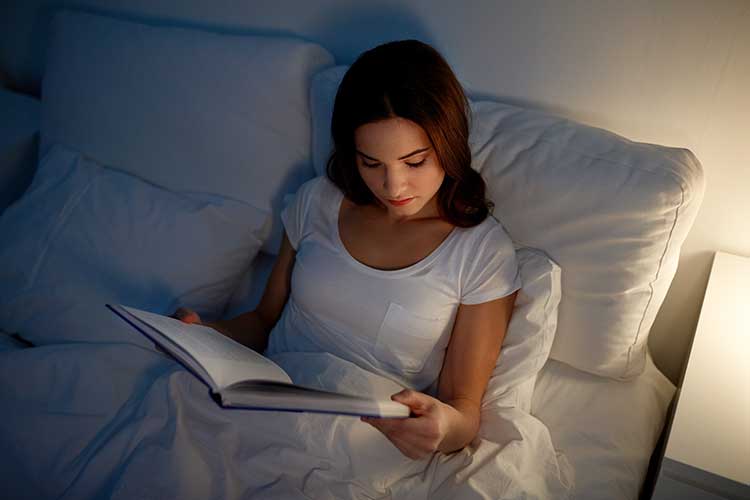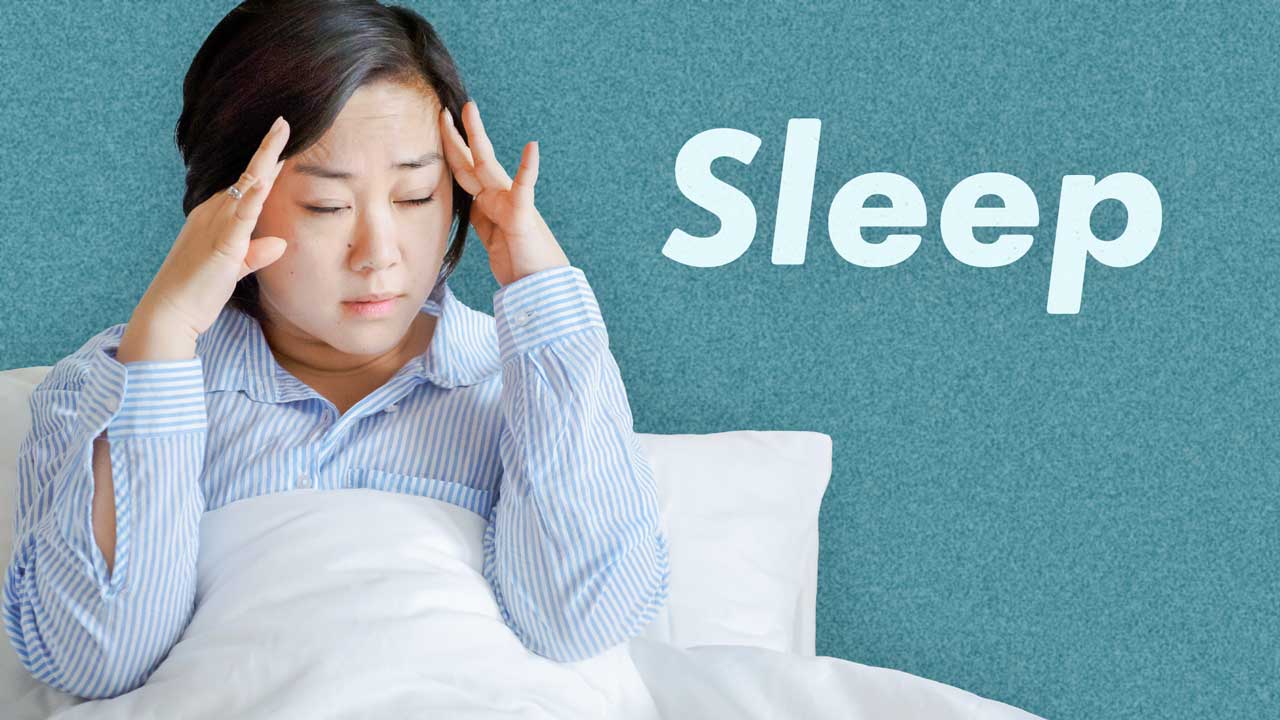Sleep: it’s not the passive activity it may seem, but rather, a distinct time for processing information and for restoration.
Why Sleep is Important
Our bodies need long periods of sleep in order to restore and rejuvenate, repair tissue, grow muscle and synthesise hormones, among other important processes (Brinkman et al. 2023).
It is worth emphasising the importance of sleep to your patients. Sleep deprivation will not only hinder the healing process but may also introduce other significant health problems into their lives (NHLBI 2022; Better Health Channel 2019; Suni & Rosen 2024).
Signs of Sleep Deprivation
An obvious sign that a patient is not getting sufficient sleep is that they complain of waking up feeling tired, and this feeling continues throughout the day.
They may also be sleep deficient if they express the urge to sleep while engaging in relaxing activities such as watching television, riding in a car or talking with a friend (NHLBI 2022).

Who is at Risk of Sleep Deprivation?
The most widely recognised causes of sleep deprivation include:
- Parenthood
- Shiftwork
- Illness
- Poor sleeping habits
- The use of certain medications
- Late-night usage of TV, the internet and social media.
People who fall into one or more of these categories should monitor their sleep habits and ensure that they are not exposing themselves to the risks of sleep deprivation (Better Health Channel 2019).
What is a Body Clock and How Does it Work?
We each have an internal ‘body clock’ that determines when we’re awake and when our body requires sleep.
The body clock has a 24-hour repeating rhythm known as the circadian rhythm.
Two processes occur in order to control this rhythm:
- A pressure to sleep, which builds while we’re awake. This craving for sleep peaks in the evening when most people are able to fall asleep.
- Our internal body clock - this is in sync with environmental cues such as light and darkness, which help us determine when we feel awake and when we feel drowsy. In the darkness, our body releases a hormone called melatonin. Melatonin tells your body that it's time to get ready for sleep and allows you to feel drowsy.
(NHLBI 2022)
Sleep Patterns
Sleep patterns change as we age:
| Age group | Recommended amount of sleep per day |
|---|---|
| Infant (4-12 months) | 12-16 hours |
| Toddler (1-2 years) | 11-14 hours |
| Preschool (3-5 years) | 10-13 hours |
| School-age (6-12 years) | 9-12 hours |
| Teenager (13-18 years) | 8-10 hours |
| Adult (18+ years) | 7 hours or more |
(Adapted from Bryan & Peters 2024)
If a patient regularly misses out on sleep, or if their sleep is of poor quality, their sleep loss adds up. The total sum of sleep lost is referred to as their sleep debt. For example, if they lose 3 hours of sleep each night, they’ll have a sleep debt of 21 hours at the end of the week (NHLBI 2022).
The Effects of Sleep Deprivation
How Does Sleep Deprivation Affect the Body?
Sleep is a vital part of the body’s healing process and crucial to the reparation of the heart and blood vessels.
Patients are to be advised that repeated sleep deficiency has been associated with a heightened risk of heart disease, kidney disease, high blood pressure, weight gain and stroke (NHLBI 2022).
Damage from sleep deficiency could occur in an instant, such as in a car crash or injury caused by a lapse of concentration. In fact, it’s estimated that sleepiness contributes to 20-30% of road accident-related deaths and severe injuries in Australia (CARRS-Q 2018).
Sleep also affects how the body reacts to insulin, the hormone that controls our blood glucose level. Sleep deficiency results in a higher-than-normal blood sugar level, which may increase a patient’s risk for diabetes (NHLBI 2022).
Additional physical symptoms of sleep deprivation include bodily fatigue and poor coordination (Better Health Channel 2019).

How Does Sleep Deprivation Affect the Mind?
Sleep deprivation has several alarming cognitive side effects. It can affect how a person thinks, feels, learns and gets along with others (Better Health Channel 2019; NHLBI 2022).
Sleep deprivation can cause difficulty with:
- Learning
- Focusing
- Reacting
- Making decisions
- Solving problems
- Remembering things
- Controlling emotions and behaviour
- Coping with change.
(NHLBI 2022)
Frighteningly, sleep deficiency also has been linked to depression, suicide and risk-taking behaviour. Studies show that sleep deficiency can affect activity in some parts of the brain. Sleep helps us pay attention, make decisions and aids our capacity for creativity (NHLBI 2022).
In children, these effects tend to be even more evident and may present as:
- Difficulty getting along with others
- Anger and impulsive behaviours
- Mood swings
- Feelings of sadness or hopelessness
- Lack of motivation
- Difficulty paying attention
- Stress.
(NHLBI 2022)
Maintaining Sleep Hygiene
The term ‘sleep hygiene’ refers to our habits and practices around sleep. We need to remind patients that when we become busy, sleep isn’t the first thing we should sacrifice.
Set Your Body Clock
Encourage your patients to have set times when they go to bed and wake up every day. Good habits start when we’re young, and therefore, children will greatly benefit from a set bedtime and a bedtime routine (NHLBI 2022).
Maintain a Sleep Schedule
Patients should maintain their sleep schedule on both weeknights and weekends. If possible, they should keep the difference between weekday and weekend rising time to no more than about an hour.
Remind patients that staying up late and sleeping in on weekends will throw off their body clock (NHLBI 2022).
Have a Quiet Hour
The hour before going to sleep should be a restful time with few stimulants.
Strenuous exercise immediately before bed should be discouraged. Bright and artificial light, such as from a TV or computer screen, is to be avoided, as the light may signal to the brain that it's time to wake up (NHLBI 2022).
Stick to a Routine

Patients may find that a nighttime routine helps to prepare them for sleep. This may include activities such as taking a bath before bed, stretching or reading a book.
Any non-stimulating activity that can be practised regularly before bed is suitable (Suni & Rosen 2024).
Diet and Drugs
Tell patients to try to avoid heavy and/or large meals within a couple of hours of bedtime (though a light snack is okay). Heavy or rich foods, fatty or fried meals, spicy dishes, citrus fruits and carbonated drinks can trigger indigestion (Suni & Rosen 2024).
Alcohol, nicotine (e.g. cigarettes) and caffeine (e.g. caffeinated soda, coffee, tea and chocolate) should be avoided before bed. Nicotine and caffeine are stimulants, and both can interfere with sleep. The effects of caffeine can persist for as long as eight hours (NHLBI 2022).
Stay Active
Spend time outside every day and be physically active. Exercise can improve our quality of sleep, so even a short walk around the block may make a difference (Suni & Rosen 2024).
Sleep Environment
Recommend that patients keep their bedrooms quiet, cool and dark and wear earplugs if noise is an issue. Bedroom activity should be limited to sleep and intimacy so that the brain associates the space with sleep as opposed to work or entertainment (Suni & Rosen 2024).
A Sleep Diary
Advise patients to write down how long they sleep each night, how alert and rested they feel in the morning, and how sleepy they feel during the day. They can then relay this information to a general practitioner or sleep expert (NHLBI 2022).
Sleep Hygiene in Healthcare
Shift work is commonplace in healthcare and staff often find it challenging to keep to a regular sleep schedule. Shift workers often find there is not enough time between each shift to sleep and spend time with friends or family before they have to get ready for their next shift.
Naps are not a substitute for sleep but may be useful when time is limited (Suni & Rosen 2024). It may also be helpful to talk to other workers about how they cope with sleep loss.

When Can Sleep Disturbance Be Classified as Insomnia?
The following can be considered as forming the grounds for a diagnosis of insomnia:
- Poor sleep quality, including:
- Trouble falling asleep
- Trouble staying asleep, and/or
- Waking up earlier than desired
- Poor sleep quality despite adequate opportunity and circumstances to sleep
- Sleep impairment that is associated with daytime impairment or distress
- Sleeping difficulty that occurs at least three times per week and has been a problem for at least three months.
(Grima et al. 2019)
Conclusion
Sleep shouldn't be an afterthought when it comes to good health. Good sleep is linked to countless health benefits, and the lack of it is known to cause significant short- and long-term problems.
Make rest a priority for your patients, and be sure to extend that care to yourself as well.
Test Your Knowledge
Question 1 of 3
True or false: It's recommended to maintain the same sleep schedule on both weeknights and weekends.
Topics
Further your knowledge
References
- Better Health Channel 2019, Sleep Explained, Victoria State Government, viewed 23 July 2024, https://www.betterhealth.vic.gov.au
- Brinkman, JE, Reddy, V & Sharma, S 2023, ‘Physiology of Sleep’, StatPearls, viewed 23 July 2024, https://www.ncbi.nlm.nih.gov
- Bryan, L & Peters, B 2024, Why Do We Need Sleep?, Sleep Foundation, viewed 23 July 2024, https://www.sleepfoundation.org
- Centre for Accident Research & Road Safety - Queensland 2018, Sleepiness and Fatigue, Queensland University of Technology, viewed 23 July 2024, https://research.qut.edu.au
- Grima, NA, Bei, B & Mansfield, D 2019, ‘Insomnia Theory and Assessment’, Australian Journal of General Practice, vol. 48, no. 4, viewed 23 July 2024, https://www1.racgp.org.au
- National Heart, Lung, and Blood Institute 2022, Sleep Deprivation and Deficiency, National Institutes of Health, viewed 23 July 2024, https://www.nhlbi.nih.gov
- Suni, E & Rosen, D 2024, Mastering Sleep Hygiene: Your Path to Quality Sleep, Sleep Foundation, viewed 23 July 2024, https://www.sleepfoundation.org
 New
New 

